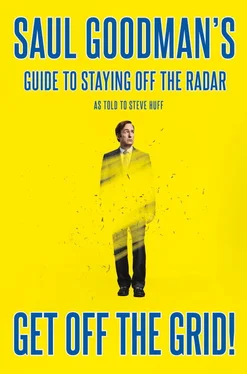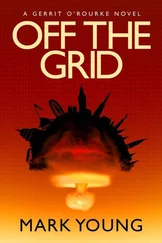If you’re out during the day, you can start practicing this in a simple way. Wear shades so that your eyes are difficult to track (that’s one big reason so many feds seem to fetishize sunglasses, by the way) and make a point to size up as many people around you as you can. Watch gestures, mannerisms, their eyes. Is that guy over there tracking you with his eyes? Is he doing it because he fancies your scarf, or because he’s trying to see if you match a description on a BOLO or a missing persons flyer?
Don’t just mark the people around you—mark the cars, too. Has that Chevy circled the block one more time than you’d reasonably expect it would take to find parking? Check the street you live on (and any adjacent ones), making note of cars that seem like they’re parked at odd times, when others are gone. Or cars parked along whatever routes you use that are just idling, with a lone passenger inside. Sure, the driver could be finishing a sandwich before moving along with his or her own errands, but that doesn’t preclude the idea that they could be keeping tabs on you, too.
In a way, focusing on observation like this can actually help alleviate the paranoia that comes with this whole thing, too. It’s remarkable just how often no one is paying attention to anyone else at all. Try not to be offended that you’re not the center of the universe, and appreciate it.
Avoid telegraphing your paranoia.So much easier said than done, huh? If this is a skill you may have developed a little late in life, it’s no cakewalk to disguise that you are scoping out every single thing that’s happening around you. Those shifty eyes will mark you as a mischievous shoplifter at best, and a demented sexual deviant at worst. “Subtlety” has to be your watchword, my friend.
Slow and steady keeps you free.If you are the hard-charging type who likes to keep up a fifteen-minute mile on a casual stroll, then this will be tough for you. Give up your East Coast big city stride, and dial it back to an unhurried Southern promenade.
In short: slow down. Leisurely paced chases are tricky to conduct, but they’re ripe for experimentation. If you quicken your speed for a block or two, then suddenly drop down to a snail’s pace: did someone nearby match you in lockstep? That person may be angling for an unpleasant rendezvous at a moment of their choosing—which is definitely not a recommended part of this program.
Unfortunately, if you spot a tail, certain options open to most people will not be available to you. Unless you are utterly convinced that your new identity is 100 percent ironclad, calling 911 in this situation is a bad idea (however: if you’re just researching this stuff for grins and giggles and have no plans to change your identity, call 911 as soon as humanly possible if you have reason to believe you’re being followed). It will just bring unwanted questions and curiosity from some of the last people you want poking at your story. So if John Q. Lawman is not at your disposal: what can you do?
Join the crowd.It’s not a bad idea to get yourself to where the people are and stay there as long as possible. Any public venue where you’re unlikely to get rousted, booted, whatever for walking in and taking a seat, use it. You might have to scrounge up a few bucks to buy a cup of coffee or ticket to the matinee (or whatever gains you entry to the space of your choice without scrutinization), but it’ll be worth it. One advantage to this is it may give you a chance to turn the tables slightly, grab a vantage point from which you can get an eye on the person you believe is watching you. You may not have had time to do a proper once-over of your new shadow when the alarm bells went off in your head, so this will give you time to take a beat and evaluate.
Time for a cool change.When laying low and humming along in your new life, it’s a good idea to stick with a steady, low-key pattern of behavior. A daily grind that’s uncomplicated, as simple as you can make it. The possibility that someone is on your tail and trying to learn more about you flips that concept on its head. If you believe some paid detective or operative of any kind is tailing you, it’s time to really throw a wrench into the cogs of your daily machinery and get unpredictable.
Tell you what I’d do. Let’s say that my Monday-to-Friday work schedule has me clocking in 9:30 AM to 4:30 PM every day. I’m in my car by nine; I’m back at home by a quarter past five. The only stops I make are to fill up the car with gas or grab a few groceries.
Anyway, if one day I spy with sunglasses-shaded eyes a vehicle cruising just out of tailgating range that has been maintaining my speed no matter if I slow down or hit the gas, I’d get off at the next available exit, regardless of where it was. If my new pal followed, I’d get right back on the highway, keeping a careful eye on them.
If I didn’t have any hard evidence that the surveillance was more than just something I was sensing (you know, that feeling you can get, the hair rising on the back of your neck), then I would shift my leave time back a half hour one day, fifteen minutes the next. I’d make part of the commute to work a walk. If I was taking the bus, I’d switch up which stops I used, and I’d leave early enough to factor that extra time into my schedule. Coming home, I might juggle my routine: randomly stopping for dinner or a movie—doing what looks like relaxed puttering, but it’s puttering with serious purpose. Throw enough kinks in that routine you’ve established, you’ll soon spot anyone making it a point to be where you are. People are creatures of habit—it’s unnatural to suddenly switch up which grocery store you get your tomatoes from, so if you notice the same sweet grandmother that’s always squeezing grapefruits at your local food emporium buying avocados at the store across town, she’s probably not there looking for fruit.
Surveillance can take many forms. It can go on for quite some time, too. It depends on the one doing the surveilling and why. It isn’t unheard of for law enforcement to keep one subject under watchful eyeballs for months at a time. If you begin to suspect this is going on, then it’s time for you to make a change. Every day will need to be different. This will give you time to plan yet another exit strategy.
We’ve still got more to talk about before you go, of course. I’ve mentioned here and there that an important element of setting up your new life is the cover story. It’s got to be plausible and easy to stick with. Essentially, you have to become a better-than-average liar. I wouldn’t be doing my duty if I didn’t give some examples of cover stories. A few as you segue into another life, and maybe a few more to tell once you’re there—because for most of us, it’s ultimately going to be impossible to avoid all social interaction.
In fact, that kind of avoidance can produce the exact opposite of what we want: attention. In our situation, it’s not sexy to get a reputation for being “mysterious.” That automatically invites unwanted questions. It doesn’t bruise my ego at this stage of my life for a coworker to think I’m some boring old guy who spends his Sundays at the Farmers’ Market. It means the heat will stay off, and I can chill out.
Cover Stories and Other Fictions
So you’ve made the decision that it’s time to start laying down the tracks that will redirect this speeding train of life. Switches will be thrown, rails shifted, and suddenly— screech —you’re off on a new track to parts unknown.
Sure, there’s the old cold-turkey approach: just vanish. If it’s very important to you that the folks who want to do you harm think you’re a goner, then absolutely vanish overnight and forget about leaving any mystery behind.
Читать дальше












